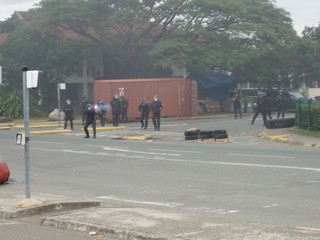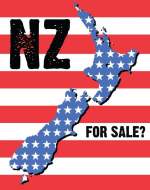New Caledonia: Workers versus Globalisation

Workers in New Caledonia are Fighting Globalisation
“We all have the same goal and that's to fight globalisation wherever it hits us. It's only by joining our struggle together that we will stop globalisation”, wrote the spokesperson for the Union of Kanak and Exploited Workers (USTKE) Pierre Chauvat, a day before his union went to blockade the port in Nouméa, New Caledonia, where one of the largest multinational shipping corporations was planning to unload its cargo, guarded by armed forces.
The USTKE is fighting back at two multinational shipping corporations the Mediterranean Shipping Company (MSC) and Maersk Shipping who are attempting to force local shipping out of the Nouméa to Sydney shipping market at the cost of around 200 local jobs. The USTKE wants the freight volume to be restricted by a quota but the French colonial government and the shipping corporations aren’t going to step down without a fight. MSC is operating from Australia and Maersk from New Zealand.
USTKE have shown the Pacific the power of direct action, occupying the port for three weeks to prevent MSC and Maersk ships from docking and unloading their cargo. The struggle has involved twenty-four hour general strikes and dangerous skirmishes with police on the picket lines.
On the 22nd of June a general strike was on again for 24 hours with blockades of companies that use MSC for freight container transport. Coca Cola was closed by 300 strikers. Food distributors and paper industrial complex in the city were also shut down. Around 1,000 strikers held 4 blockades points, while discussions took place with an MSC manager that arrived from France yesterday.
Pierre Chauvat wrote before the blockades began that, “So far the USTKE rally and mobilisation is strong and continues to develop. People are now fully aware that globalisation is a real danger for the small Pacific Island economy and some commercial protections must be taken into account to allow New Caledonia economy to grow with local controls. The amazing thing to mention is that the local government is completely out of the matter, which means that politically, this local government is detached of crucial internal affairs of the country and all elected representative of house of Congress have shirked responsibilities.”
The USTKE is active in other struggles in New Caledonia as well its fight for workers rights. It is involved in the struggle against a Canadian mining giant's nickel project in the South of New Caledonia, which has encountered strong Kanak resistance including sabotage of about US $10 million worth of mining equipment. The mine site was occupied for several weeks until police evicted them. On the fourth of June eight thousand people rallied against the mine project and were addressed by anti-globalisation hero, radical French farmer and self described anarcho-syndicalist Jose Bove. Bove spent three weeks in jail for his part in the dismantling of a McDonalds restaurant to protest globalisation.
The struggles of the USTKE are one ripple of the continued resistance of Pacific people to colonisation in whichever form it takes; economic, political and environmental. Pierre Chauvat and the USTKE are on the frontlines of a struggle that affects everyone in the world as he points out, “Our struggle is a big one. MAERSK and MSC are very strong and it seems to be that they will not give up easily. Nor we. I hope your fights succeed. I believe that the social movement is on its way, especially if we look at what's happening in South America. Hope is in front of us.”
Published in the July issue of Workers Charter, Green Left Weely and on Indymedia.org.nz
Labels: workers and unions

